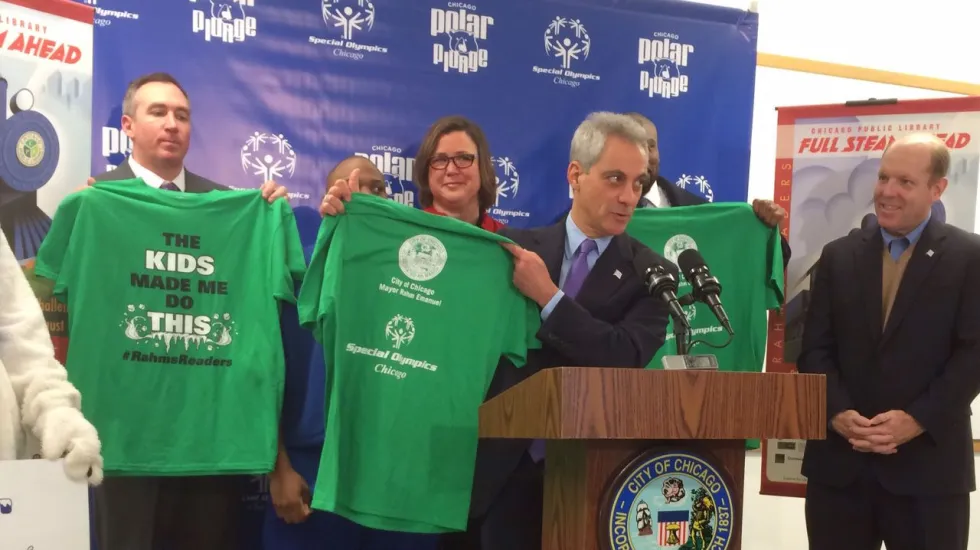
A dispute that has apparently simmered for decades over the Special Olympics brand in Chicago boiled over in federal court Wednesday when the global organization sued a local group — despite a half-century of support — to force it to stop using that name.
The complaint filed by Special Olympics Inc. alleges Special Children’s Charities of Chicago, which recently celebrated its popular Polar Plunge benefit, has wrongly been “posing online” as “Special Olympics Chicago,” even though any permission it once had to use that name ended in December 2020.
“Indeed, there is no entity called ‘Special Olympics Chicago,’” the lawsuit said.
Special Children’s Charities President Carolyn Daley answered with a lengthy statement Wednesday afternoon, calling the lawsuit “meritless,” “rife with inaccuracies” and “a veiled attempt to tarnish the reputation and good works” of the organization she leads.
She said her group is “now forced to spend financial resources on legal fees fighting a lawsuit that is without merit rather than putting those resources toward programming and support of our athletes.”
The dispute is a sensitive one given the history of the Special Olympics here, involving Eunice Kennedy Shriver and now-Illinois Supreme Court Chief Justice Anne Burke. Carolyn Daley is the niece of former Mayor Richard M. Daley.
In her statement, Daley referred to her group as “the co-founders of Special Olympics.” She said it has supported Special Olympics for more than 50 years “under the name of ‘Special Olympics Chicago’ or ‘Chicago Special Olympics’” — and has done so “with the full knowledge” of the parent organization.
Daley also told the Chicago Sun-Times that, despite the lawsuit, she “would hope” Special Olympics Inc. wants to maintain their long-running relationship.
“We look forward to continuing our decadeslong partnership, supporting people with intellectual disabilities in the City of Chicago,” Daley said.
Meanwhile, Special Olympics CEO Mary Davis told the Sun-Times her organization simply wants to protect its name and trademark.
“They are unlawfully being used as ‘Special Olympics Chicago’ by Special Children’s Charity, and we have asked numerous times for them to desist,” Davis said.
The lawsuit asks a federal judge to stop the Chicago organization from using the name “Special Olympics” or “Special Olympics Chicago.”
The lawsuit says Special Children’s Charities wrongly told donors it is a Special Olympics entity. The complaint does not allege any misuse of funds. Rather, it says the Chicago group does good work, and its more than 50 years of support “are appreciated.”
Daley noted Wednesday that her group’s six-member staff and its volunteer board of directors raises roughly $3.1 million annually, “with every dollar remaining in the City of Chicago to fund the activities and events enjoyed by our both children and adults with intellectual disabilities.”
She said the group supports an average of 7,500 athletes in the city each year. She also said 85% are athletes of color and many live at or below the poverty level. Special Olympics Inc. and Special Olympics Illinois have provided “minimal funding” for Chicago programs, she added.
The lawsuit details the history of the Special Olympics, including how Shriver, sister of President John F. Kennedy, started a camp at her home in suburban Washington, D.C., for children with special needs in the 1960s. It does not mention Burke, who was then a physical education teacher with the Chicago Park District who sought to hold a track meet for disabled children.
Burke is the wife of Ald. Edward M. Burke (14th), who for years has faced unrelated federal racketeering charges.
A partnership with Shriver developed in the 1960s with support from then-Mayor Richard J. Daley and the Chicago Park District. The first International Special Olympics Summer Games were held on July 20, 1968, at Soldier Field.
But the lawsuit lays out years of back-and-forth over the use of the “Special Olympics” name by the Chicago organization, dating back to 1983. It notes that the word “Olympics” is used by the parent organization with special approval from the U.S. Olympic Committee, and that Special Olympics Illinois is the only accredited branch of the larger organization in this state.
The U.S. Olympic Committee even intervened in a dispute with the Chicago organization about the name back in 1986, according to the lawsuit.
Eventually, it said, all sides reached an understanding in 1994 that gave Special Children’s Charities a limited right to use the name “Special Olympics” in fundraising. It was reaffirmed in 2017 ahead of the Special Olympics’ 50th anniversary celebration.
Still, frustrated that Special Children’s Charities “increasingly blurred the line between program sponsor and possible rogue actor,” Special Olympics Illinois finally terminated the 1994 deal, effective in December 2020, the lawsuit said.
Therefore, it said, “since January 1, 2021, Special Children’s Charities has not had permission to use the Special Olympics name as a mark, including in fundraising activities.”
A “Special Olympics Chicago” logo could still be seen at the top of the Special Children’s Charities’ website Wednesday afternoon. The website also gave thanks for the support received by this month’s Polar Plunge, which it said benefitted “Special Olympics Chicago” as well as Special Children’s Charities.
Several items with the “Special Olympics Chicago” logo were also available for purchase through the website, including face masks, water bottles, umbrellas, mugs and license plate holders.
Speaking to the Sun-Times, Davis said there is also a safety issue for Special Olympics athletes to consider. She said the parent organization has several procedures and protocols in place to protect the athletes.
Meanwhile, the lawsuit says some of Special Children’s Charities’ activities violated those protocols.
Daley called Davis’ remark about safety issues “baseless.”
Contributing: Tim Novak







